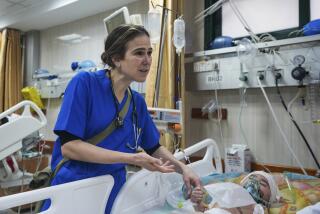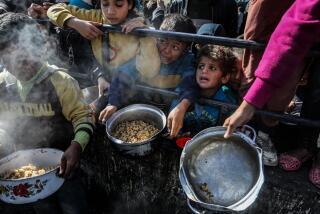Easing a Bit of Bosnia’s Pain : Victims: Last year, a grenade exploded in Mirela Kerla’s face. A journey to L.A. for surgery brings her ‘from hell into paradise.’
- Share via
Mirela Kerla, 15 years old and a witness to war, wears a gauze patch over her right eye and three strands of knotted red thread around her left wrist. They are reminders of the place she has come to and the place she has left behind.
The makeshift red bracelet was given to Mirela last week--a good luck charm fashioned by a neighbor in Bosnia-Herzegovina, Mirela’s homeland. It was there, in Sarajevo, on a sunny September afternoon last year, that Serbian fighters pitched a hand grenade that exploded in the schoolgirl’s face.
The patch comes courtesy of a Beverly Hills doctor named Neil Brourman, who on Saturday donated two hours of his time to perform delicate surgery that involved peeling back the scar tissue from Mirela’s ruptured retina in an attempt to restore vision in the injured eye.
Mirela is among 19 Bosnian war victims who came to the United States last week as part of the first medical airlift to this country from Sarajevo. This is the story of her trek from that war-ravaged city to a VIP suite in Century City Hospital--where, wrapped in a plush, white terry cloth robe, she was recuperating on Monday amid sprays of orange and purple gladioluses and a room service lunch to rival that of the finest hotels in town.
Nobody sums it up better than the teen-ager herself:
“It’s like I came into paradise,” she said, through an interpreter. “Like coming from hell into paradise.”
In another time and place, Mirela Kerla would be like any teen-ager. She likes rap music and judo. She enjoys physics but hates math. She likes dancing and hopes to work as a fashion model someday.
Instead, her biggest wish now is “for war to stop.”
On Sept. 6, 1992, war arrived at Mirela’s doorstep. It was 3 p.m. Mirela had left her girlfriend’s house and was on her way into her Sarajevo apartment when the grenade landed. She never saw it coming. The blast embedded shrapnel in her arm, knee and back, and ripped her eye right out of its socket. Curiously, Mirela did not feel that. She felt only an excruciating pain on top of her head.
And then she blacked out. For 28 days.
Her mother, who has accompanied Mirela to the United States, could not make it to the hospital to see her daughter until the day after the blast. “I was trying to save her,” Razija Kerla said. “But destiny did its job.”
It could not be said that the Kerla family was surprised by Mirela’s injury. Many in their neighborhood have been wounded or killed. The blast that injured Mirela killed three others.
Many of the girl’s friends are now gone. “Almost every day,” she says “the news comes from friends’ fathers of wounded or killed. A lot of them got killed.”
When she awoke after spending nearly a month in shock, Mirela says, the Sarajevan doctors tried to shield her from the seriousness of her wounds. They had saved the eye, but it was not long before the teen-ager realized her vision was not the same--and might never be.
Shapes that had once been clear were only shadows now. If someone held up three fingers in front of her, she could count them. But she could distinguish little else.
In all, she spent three months in a hospital bed. When she was released, the doctors suggested that perhaps she could go to a foreign nation for treatment. They and her mother wrote letters--to Belgium, France, Germany, America. Six more months went by. Six attempts were made to get Mirela the help she needed. Six replies came back, all negative.
Said Razija Kerla: “They told me it is too late.”
A little more than a week ago, Mirela’s fortunes changed. She learned that she had been selected to participate in “Operation Second Chance,” an airlift organized by a Century City Hospital administrator in conjunction with the United Nations, the U.S. Air Force and a Swiss-based relief organization, the International Organization for Migration.
The airlift took place July 26; Mirela learned of her departure two days before that. On the morning she was to make her exit from the Bosnian capital--leaving her father and 18-year-old sister behind--a neighbor braved gunfire to drive her to Kosevo Hospital. There, she was picked up in an armored car that sped through enemy territory to Sarajevo’s airport, where she and the others were taken aboard a U.S. Air Force jet.
The patients have been dispersed to hospitals across the nation. Four are in Los Angeles County and Mirela is the only one to have undergone surgery. The two-hour operation performed by Brourman on Saturday is not a guaranteed success; the doctor says it will be three to six months before he knows how much of her sight has been restored.
“I think the chances are very good that she is going to see better,” he said. “How much better? I didn’t want to promise her anything.”
It was a highly specialized procedure, one that can be fraught with complications, but Brourman said it went smoothly. Peering through a high-powered microscope, the surgeon used tiny forceps to remove the scar tissue that had formed on Mirela’s retina. The field in which he worked was no bigger than a couple of pinheads; the amount of scar tissue removed was so small it could not be seen with the naked eye.
Within the next few days, he said, Mirela may be released to the care of a host family that has volunteered to provide lodging for her and her mother. Mirela says she worries about her father and her sister, and the others she has left in Bosnia. “I feel too lucky, too lucky,” she says, “because almost all of the citizens are wounded.”
Her appreciation has not gone unnoticed at Century City Hospital, where one nurse described Mirela as the ideal patient.
“Every time we ask her if she has pain, she says no,” said nurse Dolores Tatgenhorst. “But then, you have to think of what kind of a life she has already gone through. . . . Maybe she’s really not having any pain. Or maybe, she has already had her pain.”
More to Read
Sign up for Essential California
The most important California stories and recommendations in your inbox every morning.
You may occasionally receive promotional content from the Los Angeles Times.













